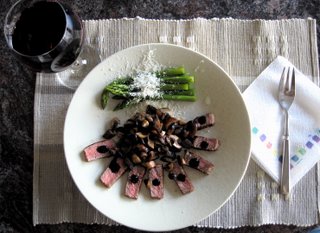In Season
Truffle Lovers, Truffle Haters -- It's Chemistry
People react to truffles in vastly different ways. Now scientists are closing in on why
By KATY MCLAUGHLIN
Staff Reporter of THE WALL STREET JOURNAL
November 5, 2005; Page P3
You've paid a small fortune to sample one of the world's great delicacies: truffles. Your waiter ceremoniously shaves a few grams over your pasta. All around you, diners are sighing with delight. But you smell zilch, and your companion complains that the pricey fungus reeks.
It's a fact -- people react to truffles in vastly different ways. Now scientists are closing in on why. Nearly 25% of the population do not smell androstenone, a chemical that contributes to truffle's signature musky aroma (and makes female pigs go into mating stance). Another 40% of people are keenly sensitive to androstenone; they say it smells like rotten wood or sweat. The rest of the population likes the smell.
![[Truffle]](http://online.wsj.com/public/resources/images/PT-AA626A_truff_20051104131754.jpg)
It all makes white-truffle season, which started in late September and usually lasts for about eight weeks, a confusing time for chefs, who are forking out roughly $1,600 a pound for the fungus this year. Mark Alba, chef at the Food Studio in Atlanta, says he's heard everything, from complaints that truffles stink to a patron who told him she could die happy after tasting them.
Researchers at the University of California at Berkeley are investigating whether varying levels of perception of the compound are due to differences in individuals' noses or in the ways the brain processes aroma messages, says Berkeley scientist Noam Sobel.
Other compounds contribute to the earthy aroma of truffles, but people's reactions to the fungus appear to mirror the population's response to androstenone. "If there weren't androstenone in truffles, the mystique would not be there," says Avery Gilbert, a consultant to the fragrance industry.
That mystique is what inspired financier Dandridge Woodworth to drop $110 last week for spaghetti with truffle shavings at Café Boulud in New York. He loved the "earthy and nutty" aroma, he says. That's just what puts off Rosalie D'Amico, a retiree in Woodinville, Wash. She says she loathes the "overpowering woodsy taste" of truffles and truffle oil and interviews waiters to make sure there is none in any dish she orders.
Oddly, it's rare to find truffle-haters among chefs and their kitchen staffs. Scientist Tim Jacob and his colleagues at Cardiff University, in Cardiff, Wales, published a study last year of test subjects who took several whiffs of androstenone -- at levels of concentration about equal to that in truffles -- three times a day. By the end of a week, subjects previously unable to detect any odor were experiencing a "honey-straw-earthy pleasantish smell," says Mr. Jacob. It may be that restaurant staffers are exposed enough to truffles to become sensitized, he says.
The bottom line: If you're tempted to drop several hundred dollars on a truffle dinner, ask a specialty food store to let you take a whiff of a truffle or a high-quality truffle oil made with genuine truffles. If you smell nothing, or overpowering notes of rotting wood, urine or sweat, you may want to save your money for another delicacy.

![[Truffle]](http://online.wsj.com/public/resources/images/PT-AA626A_truff_20051104131754.jpg)

